We called him “the Whooper”. He was a traveling salesman of some kind, I think, and he showed up about once a month in the town where I grew up. He strode around and visited many of the shops downtown, conducting his business. He also occasionally let out a very startling, ear-splitting, “whoop” noise, as if the cowboy buried inside him was somehow trying to make an appearance. I, being a shy young girl, never went near him. I think I even crossed to the other side of the street a few times when I saw and heard him coming.
Never in my wildest dreams did I think of striking up a friendly conversation with this man. I assumed he must be mentally ill, as I suspect many other people assumed. And now, in that ironic way that life has of turning things inside out and backwards, I find myself often wondering if “the Whooper” suffered from Tourette Syndrome, a neurological disorder that has become a reality that my family lives with every day.
Our youngest son was diagnosed with Tourette Syndrome (commonly called TS) in December of 2002. Like a lazy baseball sailing off a bat and smashing through a window, it was totally unanticipated. The signs, however, were there from an early age – now that we have the luxury of hindsight.
As a toddler Peter was always inquisitive and bright, but a few odd “quirks” started to appear. He was a very picky eater. He didn’t like a lot of textures and smells. He absolutely hated wearing socks, because they were too tight and restrictive. He was a real perfectionist whenever he drew a picture or made a craft – it had to be “just right” or it ended up in the garbage, torn to pieces in a tear-filled outburst. But somehow, because these traits were also visible in many other preschoolers of my acquaintance, we didn’t think too much of it. By and large, our little son was a sunny, affectionate, very precocious sweetheart.
Peter loved kindergarten, but during the year developed an odd habit of swiveling his eyes to the side. We visited a neurologist, who said it was probably due to the stress of starting school. If it didn’t go away, we were to call him. It went away.
Schoolwork always came easy to Peter, but his old perfectionism often reared its ugly head. He also found it very hard to stop what he was doing and move on to the next subject. He frequently lost his pencil or forgot to bring something important home from school. But he was one of the brightest kids in the class, so we always put it down to Peter just being Peter, kind of an “absent-minded-professor” kind of guy. Because he was also very witty and warm-hearted, he was a popular student with both staff and other students.
In grade five, the rage attacks started. He would get angry at the most trivial things, and we grew to fear his instability. It wreaked havoc on our family life. He also started tapping his foot on the floor when he walked, and his “absent-mindedness” became so pronounced that he could barely follow instructions that involved more than one task.
At first we thought his behaviour might be attributed to the stress of moving to the new charter school that he was attending, one designed for students with an aptitude for science. But that didn’t really make sense, because Peter loved his new school. Finally we again sought medical advice.
About five minutes after Peter walked into the office of the pediatric psychiatrist’s office at the Alberta Children’s Hospital on a cold December day, the doctor said, “This young man has Tourette Syndrome.” Like many people, we had barely heard of it before. We had a lot to learn.
By this time, Peter was quite aware that he was “different” from the other kids at school, and so in many ways I think the diagnosis was a relief. At least, that is how my husband and I framed it to him. Now we knew what we were dealing with, and we could get to work learning about it.
We found out that TS is characterized by tics – involuntary sounds or jerky movements that occur repeatedly at irregular intervals. Most of the time TS is accompanied by other conditions such as Obsessive Compulsive Disorder (OCD), hyperactivity, mood disorders, rage episodes, short term memory problems and sensory issues.
There is no “cure” for TS, but there are certainly many treatment choices such as medication, psychotherapy, relaxation techniques and coping strategies, all of which have helped our son to some degree. Currently, interesting research is being done in the area of deep brain stimulation in treating tics, depression and OCD, but research, as we all know, takes time.
We also discovered that some cases of TS can be very mild, and often go undiagnosed, but Peter’s case was quite severe. His tics became more pronounced as he got older, and vocal tics started showing up, too – loud barking sounds that he had no control over. We were happy to discover that “swearing” tics (known as copralalia), most often associated with TS in the media, are actually quite uncommon – affecting only about 10% of people with TS.
Peter was also diagnosed a few years later with Asperger Syndrome, which is on the “high-functioning” end of the autism spectrum. His rage-filled outbursts continued to be a very familiar occurrence, and his obsessions and compulsions became more convoluted and unrelenting. School became a nightmare, and our life began to unravel. Even though the school staff and many of his fellow students were trying to be compassionate and tolerant, Peter still felt humiliated, confused, sad and out of control. Finally, we made the decision to homeschool Peter, in an attempt to salvage our collective sanity. I quit my job as a school administrator.
I’ve noticed that, from my childhood, when faced with frightening or worrying experiences, I seek solace in books – and this was no exception. As Peter and I launched into this new experience of homeschooling, I buried myself in the works of authors I have long loved, including C. S. Lewis, in my spare time. Though Peter was calmer and happier, many of his symptoms continued unabated. I retreated even further into quiet despair.
An insight from Lewis’ book The Problem of Pain had a profound impact on me: “Pain removes the veil; it plants the flag of truth within the fortress of a rebel soul.”1 As I sat one day at our dining room table, reading and absorbing those words with my twitching, barking son beside me working on his math lesson, it did indeed feel as if a veil was being ripped off my old perceptions of myself, of God and of the world. I knew I needed to go deeper, to find a new way to live with our reality, to cope with the hopelessness and bitterness I felt, to make sense of the suffering my son was enduring, and to find the strength of spirit to help him rise above his challenges.
Part of the problem was that I was no longer in control. The outward signs of neurological disorders such as TS are so easily misinterpreted. And Peter’s physical symptoms didn’t allow us the luxury of pretending that everything was okay, even if we wanted to. Many of his completely unintentional tics and urges resulted in behaviour that looked both deliberate and extremely peculiar, even disturbing – such as tapping on my face with his fingers, or squatting down every third step as he walked. I’ve been in many shopping malls and watched people stare. I’ve sat in restaurants and noticed how uncomfortable everyone is. I’ve seen people uneasily cross to the other side of the street when they hear Peter coming, barking and yipping. It hurts.
It became increasingly clear to me that I was in love with God’s blessings, but not with God. I had long been worshiping a deity of my own construction that conveniently propped up my own ideas and plans. Needless to say, my life was now looking much different than I’d ever imagined.
All of these experiences forced me to deal with one of the biggest obstacles in my own spiritual growth – worrying about “what other people might think.” And it had to go, along with the mask of self-sufficiency I was hiding behind.
My husband and I soon came to conclusion that we had no choice except to totally lean on God to help us get through each day. And as we tried to do that, a few things became clear. We noticed that as people begin to live with a greater awareness of God’s presence and grace, competition breaks down and real community can begin. We receive the gift of freedom – freedom from our fears that we might look “needy”, and freedom from our fixation on keeping up our precious reputations. It’s all about learning to find and love what Thomas Merton calls the true self, the vulnerable self, which usually stays buried beneath our insecurities and egos. It’s also about finding that true self in others, looking beyond how they may look or act or measure up by the world’s standards.
Living with Peter has changed our family in many ways. We have over the years become very resilient, and have learned the importance of bouncing back quickly after the bad moments. We say, “I’m sorry” a lot in our family…and we say, “I love you” a lot, too. We take nothing for granted. Having a good day with no blow-ups or break-downs is cause for celebration. We don’t waste a lot of emotional energy on “small stuff”. So what if we have a few holes in our walls? Better that Peter punches a wall than a person. So what if he never wears socks? There are much more important things in life.
Through our struggles, relationships with family and friends have deepened. We have met some wonderful people through the Tourette community that we would certainly have never met otherwise. A number of very compassionate doctors, caregivers and therapists have become good friends. I would say that we are actually less fearful of the future than we were before, because even though we are living with a challenging situation, we see God’s hand daily in our lives.
A key change for our whole family, including Peter and his two siblings, is a more forgiving, inclusive perspective. We no longer make any assumptions if we see a parent having difficulty managing their screaming child in a grocery store, or if we notice an anxious, twitchy person on the bus. We know there might be a back-story that we know nothing about. Perhaps these people, like Peter, are courageously doing the very best they can. Which is all that any of us can do.
- C.S. Lewis, The Problem of Pain (first published 1940; reprinted New York; Macmillan; 1973) pg. 83.


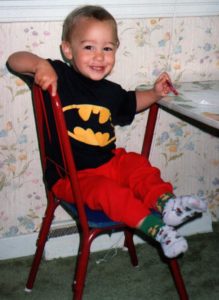
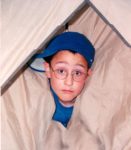
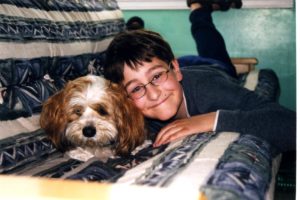
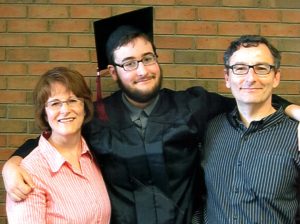
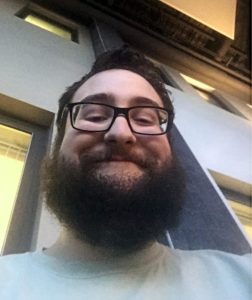






What a beautiful article about how the lives of others could be transformed by getting to know someone who is “different”. SC Lewis’ insight about pain is so true…
I love all the pictures of Peter!
I really enjoy reading the Kolbe Times… this article about Tourette Syndrome is sad and joyful and hope filled… thank-you for sharing… now I have another book to read.
Thank you for the encouraging words, Nicole! Much appreciated – and happy reading. So many good books and not enough time!